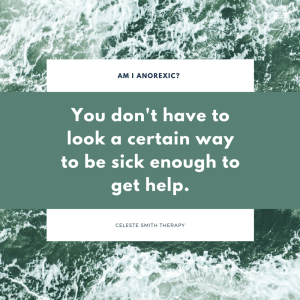Am I Anorexic? I don’t look like I have an Eating Disorder
I get this as a phone call or question from people a lot.
“I think I am anorexic.”
“I think maybe my loved one is anorexic.”
“I think I might be anorexic but I’m fat, is that possible?”
“I think my child/sister/friend is starving herself?”
There is a lot of misunderstanding around eating disorders. Let’s settle this once and for all.
Your body can be any size and have an eating disorder. ANY SIZE.
You can have all of the features of anorexia without being at a low body weight and still have an eating disorder.
With that being said this blog post is not intended to be a diagnostic tool and is not meant to be a replacement for a more thorough assessment done by a trained professional.
This blog post is designed to help you answer some questions and combat some misinformation. I wanted to throw my most frequently asked questions out. These are the questions people most often ask me when they find out about my work as an eating disorder counselor in Tyler, Texas.
Who is affected by anorexia? Literally anyone and everyone. Most people make an assumption that I must work with only teenage girls. This is a big misconception about eating disorders. In fact, 25% of people who struggle with anorexia are male. Males who struggle with anorexia also have a greater risk of mortality because they often do not receive the treatment they need until much too late. The idea that anorexia only effects a certain age, race, social status, body size, or gender is deadly and just wrong.
Can you be fat or a normal weight and have anorexia/eating disorder? I know I am answering this twice but yes. YES! I feel like it needs to be said over and over again. So often serious eating disorder behavior is ignored because of the persons body size. The behaviors are just as harmful and dangerous, no matter what size body you are in. Anorexia generally has three features:
Restriction of food intake.
Intense fear of weight gain.
Disturbance in body image.
Atypical anorexia, exists when a person has these symptoms at a “normal” or “larger” body weight. You don’t have to look a certain way to be sick enough to get help. Please don’t wait to get help until you are under a certain weight or size.
How is a person diagnosed with anorexia? It generally takes me about 90-120 minutes to assess for and diagnose an eating disorder, sometimes even then, it can take longer to really differentiate between certain categories that have similar features. I have even had clients that fit all the criteria for one diagnosis and later down the road additional information comes to light and they reveal something that changes their diagnosis. I try not to get too hung up on this. There is no need to quantify how sick a person is based on what diagnosis they receive.
How do you know if you have anorexia? What are the warning signs of anorexia? This is a great question, as early detection and treatment of eating disorders can truly save lives. I did a broader post about early detection of general eating disorders here. Some things I would look at are:
Weight fluctuations
Avoiding meals with people
Avoiding foods that were once enjoyed.
Frequent negative feelings/comments about body weight shape, or size.
Weighing and measuring often- and worthiness being tied to weight and measurement,
Loss of period/delay in onset of period.
Increased frequency or intensity of exercise.
Isolating
Changes in eating patterns.
Insisting on eating only “healthy” foods.
It never hurts to tell a person you are concerned and want to help find them help. It also never hurts to talk to someone if you are wanting a better relationship with food and your body. Even if you have all, some, or none of these symptoms the fact that you are asking, questioning, or googling is a sign that something doesn’t seem right to you.
think it is important to know that a diagnosis is simply a word used to describe a set of behaviors. A diagnosis is a tool to help therapists know what the best treatment would be, it is not meant to determine if someone is “sick enough” or deserving of help. If you are experiencing uncomfortable feelings around your body and food, that is what is most significant and it is worth addressing. You don’t have to have a certain diagnosis to seek improvement in that area. You don’t have to live in constant turmoil over food and your body. You deserve to have peace.There is a freedom that comes with getting the help you deserve. There is freedom in treating your body kindly, which I know seems impossible sometimes. Don’t wait another day to seek help, so many of my clients felt fear to come to treatment and now they say it is the best step they ever took.


